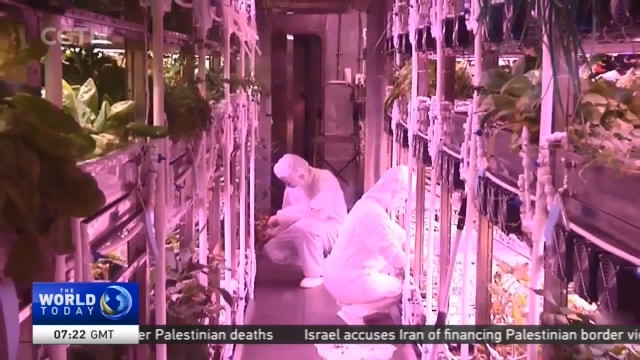
16:23, 15-May-2018
China Lunar Base: Year-long life support experiment breaks world record
02:17

China has taken a big step -- for mankind's ability to someday live on another planet. A year-long experiment has concluded, that saw volunteers living in a simulated space lab in Beijing, to learn what kind of challenges come from a life that's out of this world. CGTN's Zhao Yunfei reports.
A big home-coming welcome, right outside of Yuegong-1, a cabin that simulates life in a lunar environment. Two groups of students worked in rotations for a combined 370 days in what's called a Bio-regenerative Life Support System, two males and two females at a time. This breaks the world record set in a similar experiment made by the former Soviet Union in the early 1970s.
LIU HONG CHIEF DESIGNER, YUEGONG-1 "We built some mistakes into the system on purpose to test the sustainability of our lab."
For the past entire year, the volunteers planted crops and managed their waste according to a recycling system. Only two percent of the supplies came from outside.
ZHAO YUNFEI BEIJING "In the cabin, human waste is treated with a bio-fermentation process. That's how we get fertilizer and water to grow crops like these vegetables which are completely organic."
Yuegong-1 is the world's third base of its kind and the first developed in China. It is designed to observe how animals, plants and micro-organisms can co-exist in a lunar environment. For participants, living and working in a small space is a challenge.
LIU GUANGHUI PARTICIPANT, YUEGONG-1 "In the early phase of the experiment, I wasn't mentally prepared, but I gradually got used to my life in the lab. This experience has been something I will always view as a precious treasure of my life."
A similar trial was carried out successfully in 2014. But this most recent experiment is more complex, as the time is longer and the physical conditions for the volunteers are more diverse. China plans to send astronauts to the moon before 2036. This research provides the scientific support needed for such a mission.
WANG JUN CHINESE ACADEMY OF ENGINEERING "This project gives us a better understanding of what it's like to live and conduct explorations on the moon in a longer period of time. We'll also need this kind of system if we go to Mars."
Wang says there is still much work to do as the space lab program has to anticipate many more of the conditions that outer space has to offer. Zhao Yunfei, CGTN, Beijing.

SITEMAP
Copyright © 2018 CGTN. Beijing ICP prepared NO.16065310-3
Copyright © 2018 CGTN. Beijing ICP prepared NO.16065310-3